If you are planning to purchase a bike, you have to consider a lot of factors beforehand. The most important factor is whether you should buy a suspension or rigid fork for your beloved vehicle.
Due to that, the topic of suspension fork vs. rigid fork became relevant.
Both forks have their own unique features, and they perform efficiently in different situations.
Basically, it depends on the length and quality of the road you will ride in the first place. Plus, your riding style is also an important aspect that you have to take seriously.
A suspension fork will give you the utmost comfortable riding experience on various kinds of rough roads, and you won’t face any issues if you use this fork.
On the other hand, a rigid fork is very useful if you will ride on paved roads of good quality.
As you can see, it could get confusing for you to choose the ideal one for your purpose as both are very lucrative in terms of performance and efficiency.
Don’t worry, we have got you covered.
From the following article, you will find out all these forks and other information that will be beneficial for you in the future. Read on to find out more.
What Is a Suspension Fork?
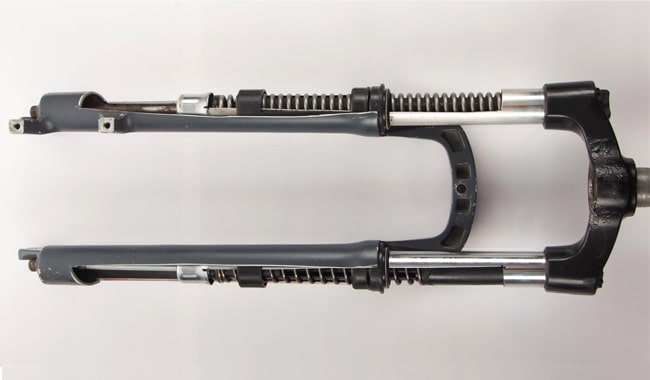
A suspension fork is the kind of fork that consists of a suspension located in one or both of the bike wheels.
It is also called a front fork that gives you some amount of travel.
The suspension is the hydraulic shock absorber that efficiently absorbs the impacts on different kinds of rough and uneven terrains.
Due to this fantastic feature, you won’t have any issue riding on challenging terrains. If you have a bike that has a suspension fork and the other doesn’t, the one with the suspension prevents the bike from shaking.
Plus, you can easily control the bike in any situation, and due to that, it is highly in demand among mountain bikers.
Also, you won’t feel pain in your arms or even wrists during the time you ride.
Which Type of Bike Provides a Suspension Fork?

If you visit the market, you will notice that two types of bikes provide suspension forks. The first one is MTB (Mountain Bike), and the second one is hybrid.
Keep in mind that not all MTBs and hybrids offer front suspension.
You might be interested to know the difference between these suspensions. The answer is pretty simple; they differ by the travel of their fork.
Surprisingly, hybrid bikes come with a short trip between 60 and 100 mm.
Though the travel range is short, you will be relieved to know that it is good enough to absorb all kinds of smaller bumps and uneven roads.
You have to be careful about not taking it to difficult terrains because it has certain limitations.
On the other hand, MTB suspensions come with a longer travel between 100 and 170 mm. These are mainly designed to not face any issue if you take the bike on challenging roads.
Advantages of a Suspension Fork
In the suspension fork vs. rigid fork competition, the former fork is loaded with multiple advantages over the latter one. Here are all the advantages of a suspension fork.
Provides an Enjoyable Experience
When it comes to bike riding, you will always prefer to have an enjoyable experience.
If you don’t like vibration and love comfort all the time, then you should definitely go for a suspension fork.
Prevents Body Aches
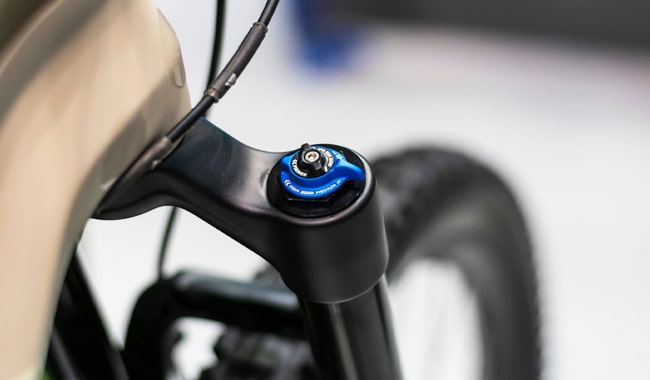
Whether you are riding on even or uneven roads, the front shock will be your ultimate savior without any doubt. Besides, you won’t have body aches during the whole riding time period.
The Front Tires’ Pressure Can Be Kept at a Maximum Level
Yes, the front suspension (shock-absorbing) allows you to keep the front tires’ pressure at a maximum level without any issue.
Fortunately, your bike won’t be damaged, and also, you won’t get a flat tire.
Suitable for Daredevil Bike Riders
If you are the type of person who is always ready to do some daredevil bike rides like crossing the tree trunks, rocks, etc., the front shock can make it happen for you.
In this case, you should opt for a full-suspension mountain bike (MTB). [ On a side note: to know more about mountain bike, read this ]
So, facing challenges in the road will be smooth for you if you have the front suspension fork in your arsenal.
Disadvantages of a Suspension Fork
Here you will find all the disadvantages of a suspension fork.
Add Additional Weight to the Bike
The biggest problem you will face with this fork is that it will add some additional weight to your bike.
You won’t notice the problem when you ride the bike on flat surfaces, but the time you lift it up or ride it to a steep hill in an upward direction, you will definitely realize the issue.
Since it adds extra weight, there is a possibility that you will not get a fast ride in a lot of areas. This will happen during the time when you have to pedal to reach the top.
Becomes Uncomfortable When Going Upward
The suspension fork always absorbs energy during your pedaling time.
You will feel that the front portion of the bike is going upward and downward when you move your body and place your body weight in the front direction.
When you climb steep hills, there will be energy loss. This overall process could make you uncomfortable.
The problem can be tackled if your front suspension comes with a lockout knob. In this case, it will work like a rigid fork.
It Is Expensive
You need to have a good budget if you are aiming to buy the suspension fork. Though it is not budget-friendly, it is still a good investment in the long run.
Besides, the maintenance process is hectic, and you might not enjoy the process. Plus, you have to take some time out of your schedule as it is time-consuming.
What Is a Rigid Fork?
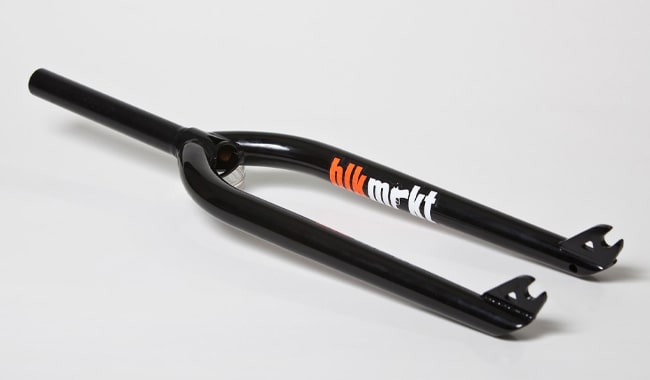
A rigid fork comes with a solid frame that has no suspension on any of the wheels. It consists of two metal supports that lock the wheel in a single position with zero travel.
The material used in it varies from model to model. Some are made of steel, while some are from titanium.
You will find this type of fork in most of the hardtail mountain bike frames.
Which Type of Bike Provides a Rigid Fork?
Surprisingly, you will be able to use MTB and hybrid bikes with this fork.
Though the hybrid one is used most of the time with a suspension fork, you can use it if you don’t plan to go mountain riding.
Advantages of a Rigid Fork
Here are all the advantages of a rigid fork.
It Is a Robust Unit
This type of fork is robust, and the manufacturer constructed it in a way that you won’t have any problem using it for a long time.
It is strong enough to withstand pressure without damaging itself.
No Maintenance is Required
The good news is you won’t have to do any maintenance if you have this fork in your bike. This saves your time and physical effort that you can invest in other purposes.
If a situation arises where you have faced a severe problem, then you will need maintenance to utilize its features in all condition
No Extra Weight Added to the Bike
Luckily, this one won’t add weight to your bike. As a result, you will be able to ride the bike smoothly and steadily.
If you want to carry it, you can easily do that, thanks to its lightweight feature.
Provides Comfortable Mountain Bike Trips
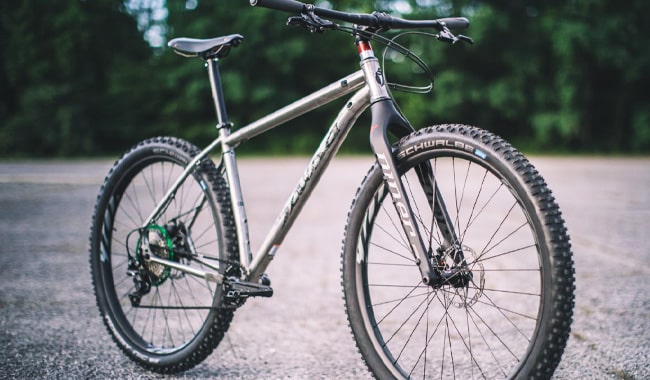
With the help of a rigid fork, you will be able to go mountain bike riding without any problem.
Plus, you can easily go for longer trips if your plan fits this requirement. Besides, it is also suitable for backpacking.
Disadvantages of a Rigid Fork
Below, you will find all the disadvantages of a rigid fork.
Not Suitable for Rough Terrains
The main problem with this fork is that it performs very badly in rough terrains. You won’t be able to finish the ride due to this issue.
In total, you will have a bad experience.
Adventurous Riders Won’t Enjoy Using It
Adventurous riders never prefer their bike to shake out of the blue. They ride on different road surfaces, and if they face this problem, they might encounter an accident.
Unfortunately, rigid forks can’t help them out in these criteria.
Controlling the Bike Gets Challenging
Whether you are a professional or an amateur, you will definitely face a problem when you have to control the bike.
The problem will be accidental, and this can get out of control if you don’t stop the bike immediately.
Fortunately, it rides smoothly on smooth terrains, and because of that, you won’t have a problem controlling it on this type of road surface.
Suspension Fork Vs Rigid Fork: Which One To Choose?
At this point, you might ask this question. For your benefit, we have done some in-depth research about this and come up with a perfect answer for your benefit.
Below, we have divided the answer into 4 different categories, and according to that, we have selected the winner in that specific category. Check them out.
Terrain
The terrain is an important factor that determines the performance of both forks.
Suspension fork performs amazingly on rough terrains and even extreme trails. This unit won’t show any issue during this critical moment, and you will get a smooth riding experience throughout the whole time.
A rigid fork won’t perform well on this type of rough surface. Due to their bad performance, you will definitely have a bad riding experience.
In this specific category of suspension fork vs rigid fork, the suspension fork takes the win.
Hydraulic Shock Absorber
This feature is the most noticeable part of any fork. Whenever a person purchases a fork, they always look for this facility.
You will be shocked to know that a rigid fork doesn’t come with a hydraulic shock absorber on any of the wheels. Because of that, you might not get a comfortable ride on different road surfaces.
Amazingly, the suspension fork has one or two hydraulic shock absorbers. These are installed on the front wheels.
Once again, the suspension fork became the winner in this category as well.
Price
The major aspect that creates a huge difference between suspension fork vs rigid fork is their price.
Since suspension forks come with several facilities, the price range is very high. If you have a limited budget, it is best that you avoid purchasing this fork.
On the other hand, rigid forks are cheaper compared to suspension ones. Though these are cheap, you won’t get extra facilities like its competitor. If you are not interested in riding on challenging trails, this fork will be the best option for you.
When it comes to price, the rigid fork is the clear winner.
Maintenance and Repairing
If you have purchased a suspension fork, you have to be mentally prepared that it will require maintenance and repairing.
Since it is a powerful unit and easily tackles rough terrains, you have to maintain it frequently so that it provides top-notch performance all the time.
With a rigid fork, you won’t have to do any maintenance or repairing. This is because it can only perform at its best in smooth terrains.
In these types of road surfaces, the fork doesn’t experience any additional pressure, unlike the rough surfaces.
So, the rigid fork is the winner in our last category.
This research shows that both of them are winners. Hence, you should go for the one that suits your bike riding needs.
Conclusion
These are all about suspension fork vs rigid fork. Go through this article a couple of times and take notes wherever you find something important.
If you still have confusion in any of the areas, consult with a professional.
Have a nice day. Best of luck!🙂

13 Best Full Suspension Mountain Bike For Beginners
Riding a suspension mountain bike is one of the passions and fondnesses for every mountain biker and bike lover. Over 75% of bikers have a

10 Types of Mountain Bikes – Which One to Buy
Imagine going down a mountain so fast that everything around you is a blur, and all you can do is trust your instincts and paddle

13 Best Mountain Bike Brands of 2023
Before discussing the best mountain bike brands, you need to believe that cycling is never all about moving around on a flat ground with your

Learn How to Choose a Mountain Bike
If you are fascinated with mountain bikes and are about to get one but cannot decide which one will adopt your riding type, mountain biking
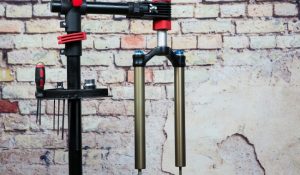
11 Best Mountain Bike Forks | [Top-Rated in 2023]
If you love bike riding on mountains, you do know that there are several precautions you should take in advance so that you can enjoy
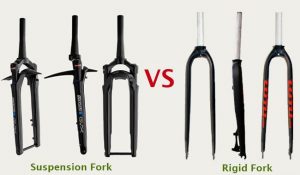
Suspension Fork vs Rigid Fork: Which One Is Better?
If you are planning to purchase a bike, you have to consider a lot of factors beforehand. The most important factor is whether you should


